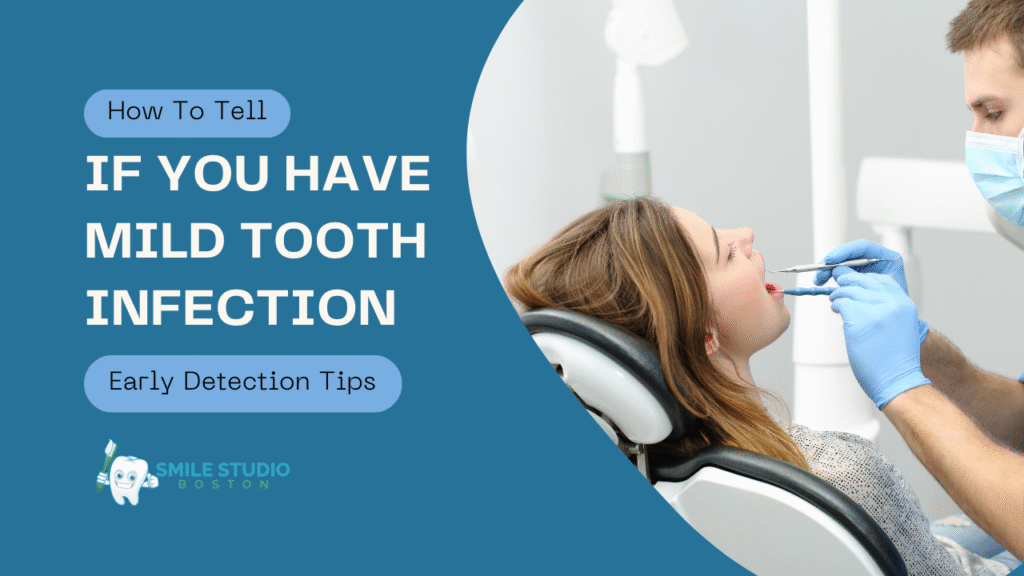A mild tooth infection may not seem like a big deal at first, but if left untreated, it can escalate into a severe dental issue. Recognizing the early warning signs can help prevent further complications, such as abscess formation or even systemic infections.
If you’ve been wondering how to tell if you have mild tooth infection, it’s essential to know the symptoms. From mild discomfort to persistent bad breath, these early signs shouldn’t be ignored. Understanding when to seek treatment can save you from unnecessary pain and costly dental procedures.
Read More; Bleeding Gums After Root Canal – Is It Normal?
I. Early Signs of a Mild Tooth Infection
A tooth infection begins when bacteria penetrate the inner layers of a tooth, usually due to decay, gum disease, or an untreated cavity. While severe infections cause obvious pain and swelling, mild infections often start with subtle symptoms, such as:
1. Tooth Sensitivity
This could indicate an underlying infection if your tooth feels sensitive when you consume hot, cold, or sugary foods. Sensitivity happens when bacteria erode the enamel, exposing the dentin and nerves beneath. Tooth sensitive infected areas may worsen over time if not treated.
2. Mild Toothache
A dull, persistent toothache is often one of the first signs of infection. Unlike occasional discomfort, an infected tooth may feel sore even when you’re not eating or drinking. If you experience mild pain that lingers or worsens, it’s best to consult a dentist.
3. Gum Swelling
Slight redness or swelling around the affected tooth is a common sign of infection. This occurs when bacteria irritate the surrounding tissues, leading to inflammation. If left untreated, swelling can progress and form an abscess. What does an abscess tooth look like? It typically appears as a swollen, pus-filled bump near the gum line.
4. Bad Breath & Unpleasant Taste
A persistent bad taste in your mouth or foul-smelling breath could be due to bacteria buildup from an infection. If proper brushing and flossing don’t resolve the issue, a tooth infection might be the cause.
Read More: Root Canal or Implant – Which One Lasts Longer?
II. When to Seek Dental Care
Many people ask “How to tell if you have mild tooth infection” Mild tooth infections may resolve on their own with good oral hygiene, but in some cases, they worsen over time. Seek dental care if you notice:
1. Persistent pain that doesn’t improve.
2. Swelling or pus around the infected tooth.
3. Fever or facial swelling could indicate the infection is spreading.
4. Jaw infection symptoms, such as difficulty chewing, tenderness, or stiffness.
5. Signs of sepsis from tooth infection, including chills, rapid heartbeat, or confusion.
If any of these symptoms occur, visit a dentist immediately. Infections that spread beyond the tooth can enter the bloodstream and cause serious health risks.
Read More: Can a Root Canal Cause Bad Breath? Understanding the Facts
III. Preventing and Treating Tooth Infections
Taking proactive steps can help prevent mild infections from becoming severe.
Oral Hygiene
1. Brush your teeth twice daily using fluoride toothpaste.
2. Floss regularly to remove bacteria from between teeth.
3. Use an antibacterial mouthwash to prevent bacterial growth.
Dietary Precautions
1. Reduce sugar intake to prevent cavities that lead to infections.
2. Stay hydrated to maintain saliva flow, which helps fight bacteria.
3. Avoid acidic or sticky foods that can weaken tooth enamel.
Professional Treatment
1. Cleaning & Fillings: If detected early, a mild infection may only require a deep cleaning or filling to stop further decay.
2. Antibiotics: Dentists may prescribe antibiotics for minor infections to prevent bacteria from spreading.
3. Root Canal Treatment: In severe cases, removing the infected pulp through a root canal may be necessary to save the tooth.
IV. Recap
Recognizing how to tell if you have mild tooth infection is the first step toward maintaining oral health. Early detection can prevent serious complications like abscesses and jaw infections. If you’re experiencing persistent discomfort, swelling, or other concerning symptoms, don’t wait—schedule an appointment with SmileStudio today for expert dental care.
Transform Your Smile with SmileStudio!
At SmileStudio, we believe everyone deserves a confident smile. Whether you need routine care, cosmetic treatments, or advanced procedures, our expert team is here to help.
Why Choose Us?
✔ Expert Dental Team – Need a crown dentist, implant dentist, or veneer dentist? Our specialists provide top-quality care.
✔ Flexible Payment Plans – Affordable options to fit your budget.
✔ Emergency Dental Care – Immediate treatment when you need it most.
✔ Walk-In Appointments – Visit our walk-in-accepted dental office anytime.
✔ MassHealth Accepted – We’re a dentist that accepts MassHealth, ensuring accessible care for all.
Book Your Appointment Today!
📞 Call: +1 (617) 265-5606
📧 Email: smilestudioboston@gmail.com
🌐 Visit: SmileStudioBoston.com
📍 Location: 1428 Dorchester Ave, Dorchester, MA 02122
SmileStudio – Where Beautiful Smiles Begin!
FAQs
1. What are the early signs of a mild tooth infection?
Common early signs include tooth sensitivity, mild pain when chewing, gum swelling, and bad breath. If you notice any of these, it’s best to consult a dentist.
2. Can a mild tooth infection go away on its own?
No, tooth infections do not heal on their own. Without treatment, the infection can worsen, leading to serious complications like a jaw infection or abscess formation.
3. How to tell if you have mild tooth infection?
Signs of a spreading infection include increased swelling, fever, severe pain, and difficulty swallowing. You should also watch for signs of sepsis from a tooth infection, such as chills and rapid heartbeat. Seek urgent dental care if you experience these symptoms.
4. What does an abscessed tooth look like?
An abscessed tooth often has swelling around the gums, pus drainage, and a pimple-like bump near the infected area. It may also cause throbbing pain and a bad taste in your mouth.
5. When should I see a dentist for a mild tooth infection?
If symptoms like tooth sensitivity, swelling, or mild pain persist for more than a few days, schedule a dental visit. Early treatment can prevent serious infections and costly procedures.


